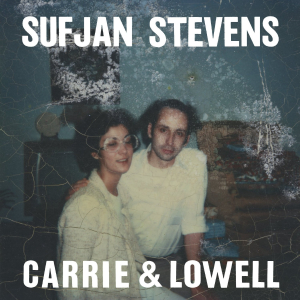 Listening that night, the album's profound and complex emotions slowly unraveled before me, and I became helplessly captivated. Not much has changed since then. Upon countless listens, I've found myself awed by Stevens's descriptions of love, heartbreak, depression, and devotion, all of which he centers around his relationships with his often-absent and deeply troubled mother (Carrie) and his heroically loving and seemingly consistently present stepfather (Lowell). In his storytelling, Stevens proves extremely generous, as he's exceedingly appreciative of his stepfather and, most powerfully, forgiving and understanding of his emotionally and often physically unavailable mother. When discussing Carrie, Stevens actually never shows resentment; rather, he succinctly and dispassionately recounts his mom's past negligence ("When I was three, maybe four / She left us at that video store") and insurmountable distance ("I just wanted to be near you," he devastatingly repeats in "Eugene").
Listening that night, the album's profound and complex emotions slowly unraveled before me, and I became helplessly captivated. Not much has changed since then. Upon countless listens, I've found myself awed by Stevens's descriptions of love, heartbreak, depression, and devotion, all of which he centers around his relationships with his often-absent and deeply troubled mother (Carrie) and his heroically loving and seemingly consistently present stepfather (Lowell). In his storytelling, Stevens proves extremely generous, as he's exceedingly appreciative of his stepfather and, most powerfully, forgiving and understanding of his emotionally and often physically unavailable mother. When discussing Carrie, Stevens actually never shows resentment; rather, he succinctly and dispassionately recounts his mom's past negligence ("When I was three, maybe four / She left us at that video store") and insurmountable distance ("I just wanted to be near you," he devastatingly repeats in "Eugene"). Even when depicting his despair, Stevens often finds moments of brightness: he ends an otherwise devastating "Should Have Known Better" with a glimmer of optimism ("My brother had a daughter / The beauty that she brings--illumination") and begins the crestfallen "Eugene" with comedy, describing how his name was frequently mispronounced as "Subaru." These lighter moments provide much needed levity and hope, considering that C&L's centerpiece features the constant refrain "We're all gonna die." This album, then, is heavy, as its subject matter damn near requires, but Stevens brilliantly allows a few strokes of light to gleam in the record's otherwise immense darkness.
2015 was an amazing year for music, but no record could match Carrie and Lowell's awe-inspiring blend of beauty and emotional depth. Echoing both despair and hope, the album explores the pangs of rejection and the intense suffering one experiences during a mother's death. That Stevens can do just that so elegantly, so tactfully, is amazing, but he uses his sorrow for something more: a plea for empathy and forgiveness. By forgiving his mother, Stevens offers the most powerful articulation of unconditional, enduring love that I've ever heard played to music. For that reason alone, C&L is a classic, the greatest album of the year and of Stevens's impressive catalogue.


No comments:
Post a Comment